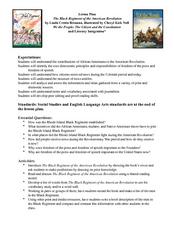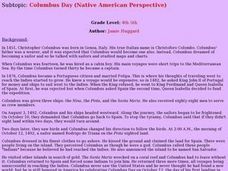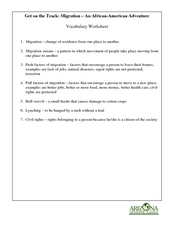NPR
Civil Rights of Japanese-American Internees
Prompted by a viewing of Emiko and Chizu Omori’s Rabbit in the Moon, a documentary about the internment of Japanese-Americans during World War II, high schoolers examine a series of documents, including the Bill of Rights and the UN’s...
Carolina K-12
What Is the American Dream?
How do you describe the American Dream? What motivates others to immigrate to the United States, and why do some groups have trouble attaining the American Dream? Your learners will consider these questions as they explore figurative...
Curated OER
Who are American Citizens?
Students investigate American citizenship. In this civics lesson, students consider the basic knowledge of U. S. government new citizens are required to have. Students also examine the 14th amendment that describes U. S. citizenship.
National Endowment for the Humanities
Lesson 3: Britain, Napoleon, and the American Embargo, 1803–1808
While the French were once the allies of Americans, the Napoleonic Wars saw the United States almost drawn into a war with its one-time friend. Wars in Europe threatened to draw in the early republic. A primary source-based activity...
Student Handouts
Working with Primary Sources: The Spanish-American War
Examine the introduction to Our Islands in Their People, written by Major-General Joseph Wheeler. The excerpt, which is about two-and-a-half pages long, is included here along with six questions about the text. Pupils can learn about the...
Curated OER
We the People: The Citizen and the Constitution: The American Revolution
The contributions of African-Americans to the American Revolution are the focus of this Social Studies and language arts lesson. After reading and discussing Linda Crotta Brennan’s The Black Regiment of the American Revolution, class...
Curated OER
The American Flag and the Pledge of Allegiance
Students create a movie from the material they have learned during the unit covering the American Flag and the Pledge of Allegiance.
Curated OER
Discovering American Symbols
Help youngsters get to know their states and capitals, explore their own country, and study American symbolism. They take a "trip" across America collecting symbols, images, and information about each state as they go (through text and...
Curated OER
Columbus Day (Native American Perspective)
Teach your class the perspective Native Americans had on Christopher Columbus. They will examine the effects of Christopher Columbus' exploration on the Native Americans using a reading theater and a carousel brainstorming activity. They...
Curated OER
The Early 19c: The Creation of an American Culture
Full of good information and photos from the 1700's to the 2004 election, this powerpoint could be a great resource in a lecture about American nationalism. While the slides require commentary and smooth transitions (as well as a little...
DocsTeach
Analyzing Einstein's Citizenship Application
Albert Einstein contributed greatly to America's history, but he wasn't always a citizen. An engaging activity analyzes Einstein's citizenship application to understand the process of immigration and how it impacts those trying to reach...
DocsTeach
Analyzing a Letter About American Indian Voting Rights
An informative activity focuses on the law preventing Native Americans from voting until 1947. Scholars read documents from the Office of Indian Affairs, complete an online worksheet, and participate in group discussion. Academics learn...
Stanford University
Japanese American Incarceration
Using documents, such as reports from government sources and civil rights activists, budding historians explore the justification for forcing hundreds of thousands of Japanese-Americans to leave their lives and re-evaluate that tragic...
Smithsonian Institution
Spanish American War
Today, Cuba and America sometimes struggle with diplomatic relations, but did you know that America went to war against Spain to free Cuba? Learners examine many interesting facts related to the Spanish American War using an informative...
DocsTeach
Comparing American and French Revolutionary Documents
This document or that? Historians compare crucial documents from both the American and French Revolution to gain a better understanding of the purpose and impact the documents had on each nation. Academics read excerpts from both...
Curated OER
American Studies
Entitled American Studies, this small unit covers various topics related to the study of the United States. Learners warm up by creating a dictionary of democracy, then dive into three different lessons focused on government, famous...
Curated OER
Migration: An African American Adventure
Learners read the book, The Great Migration by National Geographic, then complete this set of related worksheets. They review vocabulary, complete five short answer questions, discuss push and pull factors for the migration, then write a...
Museum of Tolerance
Citizenship Then and Now: Comparing Ancient Rome and Contemporary American Society
Class members research citizenship in Ancient Rome and in the United States and use the provided graphic organizers to compare the rights and responsibilities of citizens in these two democracies.
The Alamo
A Lesson in Citizenship
What does it mean to be an American citizen? Lieutenant Colonel Commander William Barret Travis believed that it meant honor to country first—even above one's own life. Middle and high schoolers read his final letters from the Alamo that...
Museum of Tolerance
The Role of Citizens in a Participatory Democracy
Groups research participatory democracies and compare the role and rights of citizens in ancient history with those in recent U.S. history. Guided by a series of questions, individuals compose a persuasive essay in which they discuss the...
Constitutional Rights Foundation
Naturalized Citizens and the Presidency
Article II, Section 1 of the U.S. Constitution takes center stage in a lesson that asks class members to assume the role of state senators, debate a resolution to amend the U. S. Constitution to permit naturalized citizens to run for...
Carolina K-12
African Americans in the United States Congress During Reconstruction
The Civil Rights Act of 1866, which granted citizenship to all males in the U.S., resulted in the first African Americans to be elected to Congress. Class members research 11 of these men, the challenges they faced, and craft...
Curated OER
Good Citizens
Students consider what qualities and values make a good citizen. Students compare the requirements to become a U.S. citizen in 1896 to current requirements. Students create a country and write out the qualities a good citizen would possess.
Curated OER
What Does It Mean To Be a Good Citizen?
Learners study citizenship and what it means to be a good sitizen. They create their own country and determine its citizenship rules. They work together to create a visual representation of what makes a good citizen.

























